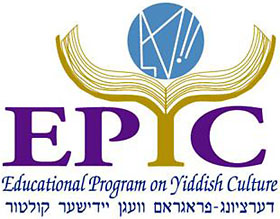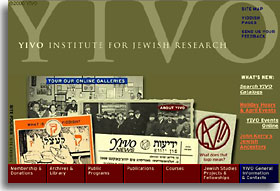

The Educational Program on Yiddish Culture (EPYC), a project of the YIVO Institute for Jewish Research, is an educational curriculum that aims to familiarize students with the Yiddish-speaking Jewish culture that flourished throughout Eastern Europe in the last 500 years.

The EPYC package has been designed for educators as a 'traveling library', encompassing the story of Eastern European Jewry, its culture and its history. It contains a diverse array of educational resources, including background material on the history of the region for teachers, a classroom-ready case study of one Jewish community, and two distinct curriculum manuals with lesson plans for direct classroom implementation. The EPYC website "When These Streets Heard Yiddish", is a multimedia companion tool to the package, enabling teachers and students to get acquainted with the great Yiddish culture of Eastern Europe by exploring archival photographs, sound recordings, and educational essays at their own pace.
Utilizing the vast archival holdings and resources of the YIVO Institute, the EPYC educational program enables teachers and students to engage in a discussion on Jewish history and culture, expressed in its religion, traditions, languages, literature, and folklore. As a multidisciplinary effort, EPYC emphasizes the importance of, and respect for, Yiddish culture. By examining Jewish life in Eastern Europe, EPYC also offers an open invitation for teachers to introduce students to the complex issues of cultural survival.
EPYC highlights the responsibility that is demanded of us all in protecting minority groups and their culture.
About YIVO
Dedicated to the study of Eastern European Jewish culture and the Yiddish language, YIVO is known worldwide for its unique library and archives, as well as for its important research publications. The only pre-Holocaust scholarly institution to transfer its mission from Europe to the United States, YIVO was founded in 1925 in Vilna, Lithuania, and has been headquartered in New York City since 1940. During and after the Second World War, renowned Yiddish writers Abraham Sutzkever, Shmerke Kaczerginski, and others conducted rescue activities of YIVO materials, ensuring their survival. Since the war, YIVO continued with its mission to collect material related to the lives of Eastern European Jews and has persisted with government negotiations to retrieve materials that were left behind. Today, YIVO continues to publish scholarly works, provide Yiddish studies, and sponsor academic conferences and other public programs. YIVO counts Sigmund Freud, Albert Einstein, and historian Simon Dubnow among its early supporters; but the soul and blood of the enterprise was in the hands of Max Weinreich, Saul Ginsburg, Elias Tcherikower, Emanuel Ringelblum and Abraham Sutzkever, towering Jewish figures of that world.
The current executive director is Dr. Carl Rheins, who heads a team of academics and specialists that continue the path of YIVO, not just as the great repository of Eastern European Jewish history and culture, but as a center of research, servicing the larger community. Each day at YIVO, we actively preserve the memory and promote the study of East European Jewish history and culture. Through our distinct programs and activities, we educate the public, serve the international academic community and contribute to the perseverance of Yiddish culture.



